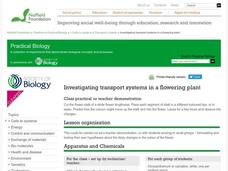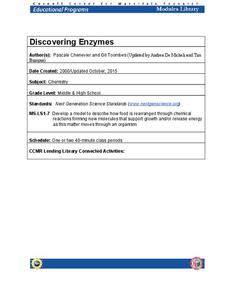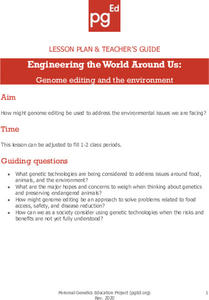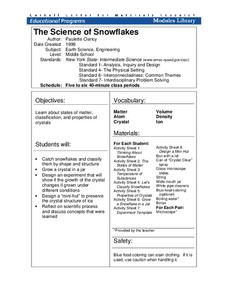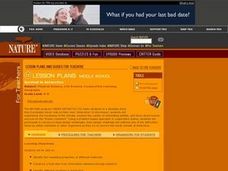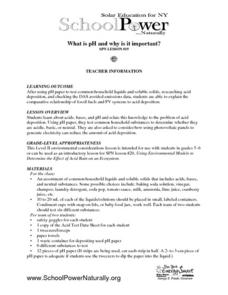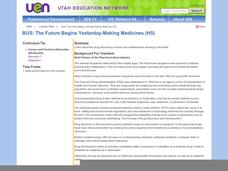Cornell University
Non-Newtonian Fluids—How Slow Can You Go?
Children enjoy playing with silly putty, but it provides more than just fun. Young scientists make their own silly putty using different recipes. After a bit of fun, they test and graph the viscosity of each.
Centers for Disease Control and Prevention
Teach Mrs. Jones' Class about Microbes
During a biology lesson, scholars research microbes, design a lesson plan using an outline, and present the lesson to the class.
Curated OER
Inuit Sled Dogs
This is a terrific resource! Have your class learn about Inuit sled dogs using this instructional activity. They discuss how the Inuit travel and the needs of their sled dogs. This instructional activity includes a math activity,...
Cornell University
Buoyancy
Swimmers know to float by turning their bodies horizontally rather than vertically, but why does that make a difference? In an interesting lesson, scholars explore buoyancy and the properties of air and water. They test cups to see which...
Curated OER
Independence and Conservation
Students read an original story "Brothers of the Rainforest" downloaded from the internet site provided. Students investigate the impact of the demise of a particular species on the rest of the environment. Students participate in a...
Curated OER
Chemical Changes Making Foam and Using Indicators
Students are able to observe chemcial and physical changes while producing a brilliant formation of foam. They are able to experience the use of an indicator in the reaction. Students record information based on their observations.
Curated OER
A Photosynthesis Timeline
Science learners discover that scientific advancements come in increments. Beginning as an idea, changes and developments are influenced by available resources and current societal values. As an example, pupils examine the conclusions...
Curated OER
Dietician/Nutritionist
Explore the difference between a dietician and a nutritionist and then examine how these professionals serve the community. A PowerPoint presentation and accompanying worksheet are provided to teach this career exploration material. A...
Curated OER
A Simple Model for Natural Selection
Do you have what it takes to survive as a fit predator or will elusive prey lead to your extinction? Find out in a creative natural selection activity. Using different colors and shapes of grains to represent different species and...
Nuffield Foundation
Investigating Transport Systems in a Flowering Plant
Some weddings have flowers in a unique, unnatural color to match the theme. Young scientists take part in this process to learn about the function of the xylem as they observe colored water moving through a flower. Then, they experiment...
Curated OER
Can You Bag It?
Put your class's observational skills to the test with a science experiment about paper and plastic bags. After reading some background knowledge about the materials in plastic grocery bags, third graders interpret a chart to answer a...
Curated OER
Organ Systems
Students examine organisms that are composed of tissues, organs, and systems. They dissect a fetal pig and explore the assigned organs systems such as the skeletal, muscular, and circulatory organs. Students identify and explain their...
Cornell University
Discovering Enzymes
Explore the function of enzymes through a series of lab investigations. Learners use household enzymes such as hydrogen peroxide to model the role of enzymes. The enzymes break down proteins with and without a catalyst.
Cornell University
Polymers: Making Silly Putty
Putty is proof that learning can be fun! Share the wonderful world of polymers with your class through an experiment. Young scientists create their own silly putty, then examine its properties.
Cornell University
Sound Off!
Time to witness the effects of sound. Learners analyze different materials to determine their abilities to absorb sound waves. They use free software to monitor the amplitude of the waves to verify results.
Curated OER
Cup Capacity Tool: Measuring Cup
Students examine containers and their capacity. They fill a one-cup measuring cup with water and pour cups of water into other containers. Through observation, students discover how many cups make a pint, and how many teaspoons make a...
Curated OER
Take a Stab!
Your geology class practices taking core samples of a potato to examine the stratigraphy. This is a terrific modeling lesson that helps youngsters visualize strata that cannot be seen from the surface of the ground. The directions...
Personal Genetics Education Project
Engineering the World Around Us: Genome Editing and the Environment
Challenge young minds to build a better world with genetic engineering. Biologists learn potential solutions for environmental issues using genome editing while interacting with three case studies. Scholars read articles and view...
Curated OER
Starting a New Settlement
For this Starting a New Settlement worksheet, learners look at a picture of a new settlement and answer 2 questions about it. Students discuss answers with a partner, research a different settlement, and describe an imaginary settlement...
Curated OER
Human Parts
Very young learners who are studying the human body will use this worksheet to identify certain body parts. A cartoon drawing of a boy is shown, and learners must draw lines matching up words such as arm, tummy, foot, and toes to the...
Cornell University
The Science of Snowflakes
Who can grow the best crystals? Challenge class members to develop strategies for enhancing growth in the crystals. Through a lab investigation, learners study the properties of crystals and test the effectiveness of different...
Curated OER
Survival in Antarctica
Explore the harsh climate of Antarctica and its wildlife. Participate in experiments to determine how humans survive in the continent's climate, and address the difficulties faced by scientists.
Curated OER
What is pH and Why is It Important?
Students investigate about acids, bases, and pH and relate this information to the problem of acid deposition. They use pH paper, students test common household substances to determine whether they are acidic, basic, or neutral. Pupils...
Curated OER
BUS: The Future Begins Yesterday-Making Medicines
Your learners have all been to the drug store to pick up a prescription, but have they considered working on the other side of the counter? Discuss the potential career possibilities available to those interested in the pharmaceutical...
Other popular searches
- Food Safety and Sanitation
- Food Safety Worksheet
- Food Safety Puzzle
- Food Safety Cycle
- Food Safety Lesson Plans
- Food Safety and Hygiene
- Food Safety Team Members
- Nutrition Food Safety
- Food Safety Storage
- Food Safety Procedures
- Government and Food Safety
- Food Safety Labs









